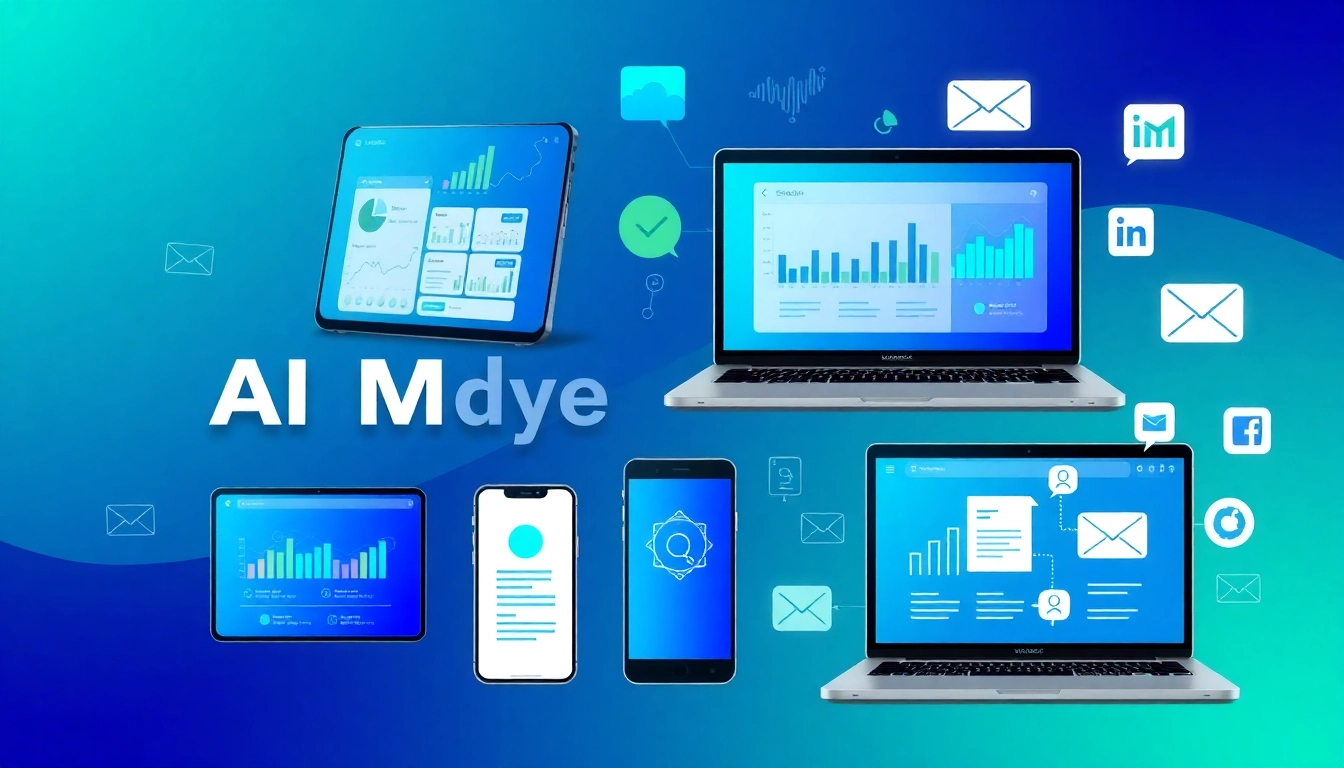Understanding AI Marketing Tools
What Are AI Marketing Tools?
AI marketing tools are sophisticated software applications that leverage artificial intelligence techniques to enhance marketing efforts. By utilizing algorithms and data analytics, these tools can automate processes, analyze consumer behavior, and produce tailored marketing strategies. Today’s businesses face the challenge of maintaining competitive advantages in rapidly evolving markets; hence, AI marketing tools have emerged as pivotal assets. They streamline efforts in customer engagement, lead generation, and content creation, essentially revolutionizing how companies communicate and connect with their audiences.
How AI Tools Improve Marketing Strategies
By integrating AI tools into marketing strategies, businesses can enhance targeting precision and overall campaign effectiveness. AI tools facilitate:
- Automation: Repetitive tasks like email marketing, social media posting, and data entry can be automated to increase efficiency.
- Data Analysis: Advanced algorithms can analyze vast datasets to uncover consumer insights and market trends, allowing businesses to make informed decisions.
- Personalization: AI tools enable hyper-personalized marketing communications by analyzing individual behavior and preferences, creating tailored experiences that resonate with customers.
- Predictive Analytics: By forecasting future consumer behavior through historical data, AI tools help marketers optimize their strategies and anticipate market changes.
Key Features of Effective AI Marketing Tools
To maximize the benefits of AI marketing tools, it is essential to understand the features that define their effectiveness:
- Machine Learning: The ability to learn from data over time, improving accuracy and outcomes of marketing campaigns.
- Natural Language Processing (NLP): Enables the analysis of consumer sentiment and feedback, aiding in the creation of relevant marketing strategies.
- Integration Capabilities: These tools should seamlessly integrate with existing marketing platforms (e.g., CRMs and social media tools) for a holistic view.
- User-Friendly Interfaces: A simple, intuitive interface enhances team engagement and minimizes the learning curve for users.
Top AI Marketing Tools to Consider
Must-Have Tools for Every Business
As we delve into specific tools, consider these indispensable assets for your marketing toolkit:
- HubSpot: This comprehensive platform offers AI-driven CRM, email marketing, and content management solutions, making it an excellent choice for businesses looking to consolidate their marketing efforts.
- Canva: Known for its design capabilities, Canva’s AI features can help marketers create visually appealing content through easy drag-and-drop functionalities and design suggestions based on current trends.
- SEMrush: A powerful tool for SEO and content marketing, SEMrush utilizes AI to generate keyword insights and content optimization suggestions critical for driving organic traffic.
- Jasper: This AI content generation tool helps marketers draft copy for various contexts, from blog posts to social media updates, saving time while ensuring quality content production.
Emerging Tools on the Market
The landscape of AI marketing tools is constantly evolving, with new players entering the field. Here are some emerging tools worth exploring:
- Replo: Designed for e-commerce, Replo helps businesses create customized landing pages powered by AI insights, streamlining the conversion process.
- FeedHive: A social media management tool that automates content recycling and schedules posts intelligently based on user engagement data.
- Flick: Aiding content creation on social media, Flick uses AI to suggest optimal times for posting and content types based on audience interaction patterns.
Comparative Analysis of Popular AI Solutions
Conducting a comparative analysis of popular AI marketing solutions can aid in decision-making. Here is a snapshot of how some top tools stack up:
| Tool | Key Features | Best For |
|---|---|---|
| HubSpot | CRM, Email Automation, Analytics | All-in-One Marketing |
| Canva | Graphic Design, Templates, Collaboration Tools | Visual Content Creation |
| SEMrush | SEO Tools, Keyword Analytics, Competitor Research | Content Optimization |
| Jasper | Content Generation, SEO Optimization | Content Marketers |
Implementing AI Marketing Tools in Your Strategy
Steps to Integrate AI into Marketing Plans
Integrating AI marketing tools requires a structured approach. Here’s a step-by-step guide:
- Define Your Goals: Identify specific marketing objectives that AI tools could assist with, such as enhancing customer engagement or streamlining content creation.
- Choose the Right Tools: Based on your goals, select tools that offer features aligning with your marketing needs.
- Train Your Team: Equip your team with the necessary training to utilize the tools effectively, ensuring everyone understands how to leverage AI to their advantage.
- Monitor and Optimize: Continually assess the performance of AI tools and tweak strategies based on data insights and outcomes.
Best Practices for Usage
To maximize the benefits of AI marketing tools, consider these best practices:
- Regularly Update Data: Ensure your data is current, as AI tools rely heavily on accurate data to generate effective insights.
- Blend AI with Human Creativity: Use AI tools to enhance your creativity, not replace it; focus on combining data-driven insights with human intuition and innovation.
- Test and Experiment: Experiment with different strategies and monitor outcomes, as AI tools can provide diverse results based on slight adjustments.
Measuring Success with AI Tools
Measuring the success of AI marketing tools is crucial for understanding their impact on your business. Key performance indicators (KPIs) to track include:
- Engagement Rates: Analyze changes in customer engagement across various channels.
- Conversion Rates: Monitor how AI tools influence your lead generation and conversion rates to measure effectiveness.
- Return on Investment (ROI): Calculate the ROI from implemented AI strategies to justify expenditures and guide future investments.
Case Studies: Success Stories with AI Marketing Tools
Small Businesses Thriving with AI Solutions
Small businesses can significantly benefit from AI marketing tools. For instance, a local café started using AI-driven email marketing to automate its newsletters. The result was a 30% increase in customer visits due to personalized offers based on past purchases.
Large Enterprises Utilizing AI Tools
Large enterprises, such as multinational retail chains, utilize AI tools to manage vast amounts of customer data. By leveraging AI analytics, a major retailer was able to adjust inventory and marketing strategies dynamically, reducing excess stock by 25% while improving sales performance across its outlets.
Lessons Learned from Implementation
Implementation isn’t without challenges. Companies that have successfully integrated AI into their marketing strategies often highlight the importance of:
- Continuous Learning: The digital marketing landscape is ever-changing; therefore, continuous education and adaptation are essential for long-term success.
- Cross-Department Collaboration: Successful implementation often hinges on collaboration between IT, marketing, and data analysis teams to ensure smooth operations and data flows.
Future Trends in AI Marketing Tools
Predictions for AI in Marketing Beyond 2025
The future of AI in marketing suggests deeper integration and more advanced capabilities. As algorithms improve, expect AI tools to offer even more accurate predictive analytics, enabling highly personalized marketing strategies tailored to individual consumer behaviors and preferences.
Technological Advances Shaping the Industry
Technological innovations such as natural language processing and machine learning enhancements will drive further developments in AI marketing tools. Emerging AI capabilities will allow marketers to automate more complex processes, from real-time customer segmentation to dynamic content generation across platforms.
Preparing for the Future of Marketing with AI
To prepare for the future of marketing, businesses should:
- Stay Informed: Keeping abreast of the latest trends and technological developments in AI marketing will facilitate faster adaptation to changes.
- Invest in Training: Prioritizing team training will ensure that marketers can utilize new AI tools effectively as they become available.
- Prioritize Data Privacy: As AI tools become more prevalent, ensuring that data privacy compliance is maintained will be crucial in maintaining customer trust and meeting regulatory requirements.



